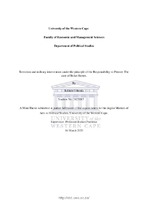| dc.contributor.advisor | Pretorius, Joelien | |
| dc.contributor.author | Sibanda, Sehlule | |
| dc.date.accessioned | 2020-10-06T12:27:33Z | |
| dc.date.available | 2020-10-06T12:27:33Z | |
| dc.date.issued | 2020 | |
| dc.identifier.uri | http://hdl.handle.net/11394/7343 | |
| dc.description | Masters of Art | en_US |
| dc.description.abstract | Intervention is a controversial issue in international relations. In recent years, the issue of intervention has been further complicated by the attention given to terrorism following the 9/11 attacks on the United States (US) by the terrorist group under the name of Al Qaeda. In 2005, the United Nations (UN) member states adopted the Responsibility to Protect (R2P) principle that was coined by the Canadian government to give intervention a multilateral dimension. The R2P principle was established to protect civilians from four atrocity crimes, namely genocide, war crimes, crimes against humanity and ethnic cleansing. R2P gives the international community authority to intervene in situations where states are failing to protect their citizens from the aforementioned atrocity crimes. | en_US |
| dc.language.iso | en | en_US |
| dc.publisher | University of Western Cape | en_US |
| dc.subject | terrorism | en_US |
| dc.subject | responsibility to protect | en_US |
| dc.subject | Boko Haram | en_US |
| dc.subject | Nigeria | en_US |
| dc.subject | intervention | en_US |
| dc.title | Terrorism and military intervention under the principle of the Responsibility to Protect: The case of Boko Haram. | en_US |
| dc.rights.holder | University of Western Cape | en_US |

